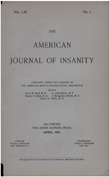REMARKS UPON INSANITY AND EPILEPSY IN REGARD TO THE DURATION OF LIFE
Abstract
(I) Insanity per se is inimical to life. It is a deterioration mental and physical. It causes more deaths in every quinquennium among the certified insane in asylums than in corresponding periods among the general population. Cases least affected are those holding fixed ideas, sometimes called paranoiacs or persons suffering from delusional insanity as are also those in whom an acute attack of insanity has left moderate but chronic weak-mind-edness. Congenital weak-mindedness diminishes the expectation of life.
(2) The most powerful and the most frequent antecedent of insanity and of epilepsy is either ancestral insanity or epilepsy.
(3) All medical forms of inquiry used in insurance offices should ask whether there is a history of ancestral insanity (parents and grandparents) and collaterals (uncles and aunts).
(4) That a suicidal tendency is eminently heritable—often appearing at the same age in the offspring as in the ancestor.
(5) That suicides in asylums occur less frequently by one-half than in the general population during the period of greatest liability.
(6) That phthisis and insanity are strong converging factors towards insanity.
(7) That epilepsy shortens life—more so by an average of ten years—than insanity.
(8) That antecedent syphilis in many assurable cases cannot be definitely ascertained either by admission of the fact or by its sequelæ and that general paralysis occurs not more often than in about I% of all cases which have contracted syphilis.
Access content
To read the fulltext, please use one of the options below to sign in or purchase access.- Personal login
- Institutional Login
- Sign in via OpenAthens
- Register for access
-
Please login/register if you wish to pair your device and check access availability.
Not a subscriber?
PsychiatryOnline subscription options offer access to the DSM-5 library, books, journals, CME, and patient resources. This all-in-one virtual library provides psychiatrists and mental health professionals with key resources for diagnosis, treatment, research, and professional development.
Need more help? PsychiatryOnline Customer Service may be reached by emailing [email protected] or by calling 800-368-5777 (in the U.S.) or 703-907-7322 (outside the U.S.).



